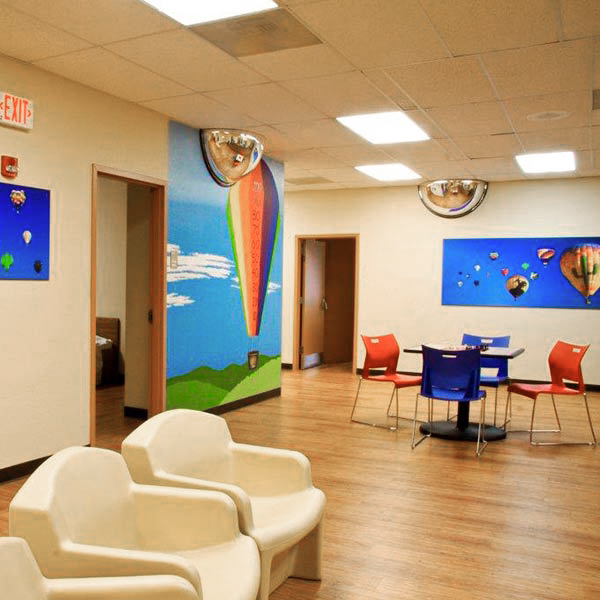Sonora Behavioral Health Hospital is dedicated to providing superior treatment to children, teens, and adults suffering from PTSD. Located in Tucson, Sonora provides the comprehensive care needed to successfully manage mental health disorders and lead a life of recovery.
Treatment for PTSD
Learn More About Treatment for PTSD at Sonora Behavioral Health
Posttraumatic stress disorder, also known as PTSD, is a debilitating condition that can affect adults and children alike. Occurring after a person experiences, witnesses, or learns about a trauma or traumatic event, someone with this mental illness struggles to cope with everyday life. Accidents, natural or manmade disasters, deployment, or the sudden loss of a loved one or friend can trigger symptoms of PTSD and lead to impaired functioning in school, work, home, or in the community. Individuals with PTSD have a greater susceptibility to developing substance abuse problems and other mental health conditions. Luckily, there are treatment options available to minimize PTSD symptoms and return a person to a life of healthy, normal functioning.
Sonora Behavioral Health, a 140-bed leading acute inpatient psychiatric hospital in Tucson, is a leading provider of treatment for children, adolescents, and adults struggling with PTSD. We acknowledge the unique needs of patients who are struggling with mental health concerns and diligently work with patients and their families in working towards recovery. With treatment that is designed to address every aspect of mental health conditions, like posttraumatic stress disorder, we at Sonora implement treatment modalities and techniques geared towards alleviating distressing symptoms and restoring healthy functioning.
Helping a Loved One
Helping a Loved One or Family Member Get Treatment
Friends and loved ones of a person struggling with PTSD may wish that they could erase the event or events that led to the incapacitating symptoms associated with this mental health condition. They may feel hopeless as they watch their friend or loved one succumb to symptoms and become a person they do not know. Even if it seems as though nothing can be done to help, here are a few tips that can alleviate those feelings of hopelessness:
- Learn about posttraumatic stress disorder – Possessing a greater understanding of what your friend or loved one is going through can be extremely helpful in being able to empathize with the person suffering from PTSD.
- Consider researching treatment options that can help your loved one.
- Share your concerns and talk about seeking treatment with your friend or loved one.
- Remain a constant source of support and encouragement; your friend or loved one needs it.
Why Choose Us
Why Consider Treatment at Sonora Behavioral Health
Loss of employment, divorce, substance use or addiction, and suicidal ideations are common in people who do not get treatment for posttraumatic stress disorder. The symptoms and effects of this disorder can make a person feel as though he or she has no control over life.Mundane aspects of life, like socializing with others or going out in the community, can seem like impossible obstacles and add to the already hindering symptoms of PTSD. Flashbacks and nightmares can infringe upon a person’s ability to sleep properly and invasive thoughts about potential harm can make leaving the house difficult. What is important to know is that PTSD does not have to be a life-long battle. Treatment is out there and can restore a person’s life to what it was before the trauma or traumatic event.
Inpatient care at a treatment center can be extremely beneficial in helping individuals in Tucson who are suffering from posttraumatic stress disorder. Provided in a safe and nurturing environment, people struggling with flashbacks, nightmares, intrusive thoughts, and memories of their traumas can receive instant support from staff and fellow patients. By entering an inpatient program, individuals can leave everyday life behind and focus on healing and recovery. Moreover, a person with PTSD can learn new skills that can improve functioning and methods of coping that can reduce problematic symptoms. Inpatient care, a proven effective approach to treating PTSD, has helped countless people resume life, free from the strife that comes with posttraumatic stress disorder.
Philosophy & Benefits
PTSD Treatment Philosophy and Benefits
As the leading psychiatric treatment center in Tucson, we make it our mission to provide behavioral healthcare services that meet the unique needs of each patient. We employ proven and evidence-based treatment modalities and techniques that teach effective coping skills needed to live a happy life. Our experienced and qualified staff diligently work to provide comprehensive medical and psychiatric assessments, diagnostic services, and treatment. By treating acute illnesses in a sensitive and caring manner, Sonora’s staff is able to assist patients in regaining and maintaining their highest level of functioning.
Types of Treatment
Types of Treatment Offered at Sonora Behavioral Health Hospital
Upon arrival at our psychiatric hospital, each patient who comes to us for PTSD treatment will complete an initial assessment that will include a physical examination, collection of medical history, psychiatric evaluation, and psychological assessment. During this time, we will also identify social skills, cultural and family strengths, and determine any other needs that each patient may have. We use a multidisciplinary approach with each patient and our psychiatric clinical team is composed of psychiatrists, psychiatric nurses, social workers, therapists, internists, and expressive art therapists who are all trained and experienced in treating individuals with emotional health and substance abuse issues. All treatment plans are individualized and include the following methods:
Medication management: Some people require medication to alleviate the debilitating symptoms of posttraumatic stress disorder. When pharmaceutical intervention meets the needs of a patient, medical staff, including nurses and psychiatrists, will work with the individual in exploring this option for treatment. Furthermore, individuals prescribed medication are monitored so as to ensure that proper medication is being administered to alleviate distressing symptoms.
Group therapy: At our psychiatric treatment center, the main form of treatment is daily group therapy sessions. We use solution-focused groups that teach patients a variety of skills needed to recover from PTSD. Some of our group topics include sleep, hygiene, coping skills, stress management, self-awareness, relaxation, and self-help skills training.
Family meetings: Family members are involved in all aspects of the treatment process and receive education about their loved one’s condition. In addition, family members are in constant communication with case managers throughout their loved one’s stay.
Additional treatment methods may include the following:
- Recreation therapy
- Daily meetings with social worker
- Expressive therapy, including art therapy
- Weekly dietary groups
Continuing Care
The discharge planning process begins as soon as a patient is admitted to our hospital. Within 48 hours of admission, a social worker will evaluate each patient for available resources, including placement, transportation, and aftercare treatment. When it is time for the patient to leave our hospital, the social worker will coordinate placement with the patient, family members, outside agencies, or private insurance. They will also coordinate transportation from the hospital on the day of discharge to the patient’s next placement, as well as aftercare treatment appointments based on each patient’s individual needs.
Depending on a patient’s specific situation, the next step in their healing process may include stepping down to the partial hospitalization program (PHP) at Sonora Behavioral Health Hospital. This program is held five days a week for six hours a day and includes tracks for both mental health concerns and chemical dependency. People who take part in our PHP leave when the treatment day ends, so they can continue attending school or going to work while receiving treatment. Our PHP offers a highly structured group therapy schedule, which allows participants to process real-life scenarios as they happen and practice the new coping techniques they are learning in therapy. PHP participants also get the chance to process any painful memories or emotions that may have kept them from success.
In addition to our PHP, we also offer an aftercare program for alumni once a month for as long as patients need. All services at Sonora Behavioral Health encourage patient success as individuals navigate the healing process. For those who are suffering from posttraumatic stress disorder, Sonora can be the jumping off point for a healthier, happier future.














